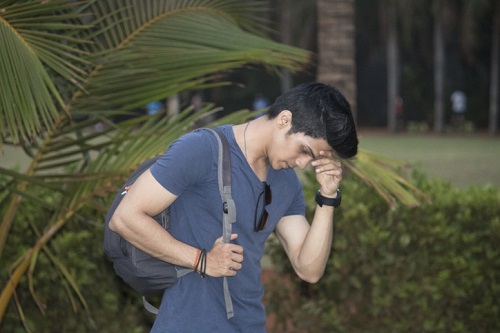Anxiety in young adults seems to be becoming more and more common – but what causes it, and how can it be treated?
Research shows that at least one in seven children and adolescents have experienced bullying, and that this may lead to the development of mental illnesses during adolescence and adulthood – in particular, anxiety and depressive disorders.
Recent studies have also found that friendship quality, peer rejection, and peer victimisation are associated with the development of social anxiety.
Doing a brief search on “Dr Google”, we could easily find hundreds of articles on bullying, its impact, and how to respond to bullying.
In this article however, we will instead talk about what you could do when the bullying times are long gone, but you are now suffering from anxiety as a young adult.
Treating Anxiety in Young Adults
Two of the therapeutic approaches used in the treatment of anxiety in young adults are Cognitive Behavioural Therapy and Emotional Freedom Techniques.
Cognitive Behavioural Therapy (CBT): CBT aims to directly teach the young person to alter dysfunctional ways of thinking and patterns of behaviour in order to reduce psychological suffering and symptoms.
It is argued that most anxiety disorders share the underlying exaggerated appraisal of threat. Therefore, when treating anxiety, CBT focuses on challenging and changing maladaptive beliefs about the likelihood and the reality of the anticipated threat, through the use of various techniques.
Clients are taught relaxation skills to use during the heightened states. Over time, they also learn to monitor, identify, and challenge their thoughts.
In the end, their subconscious negative belief will be explored and challenged. For example, the psychologist might explore the deeper meaning of the bullying victimisation for the client. Often it could lead to negative beliefs like “I am unlovable”.
Indeed, research has shown that receiving CBT results in symptom improvement among individuals with Post-traumatic Stress Disorder (PTSD), Generalised Anxiety Disorder (GAD), Obsessive Compulsive Disorder (OCD), Panic Disorder (PD), and anxiety disorders in general.
However, no one person is the same. Every young adult has different experiences in regards to their symptoms. CBT relies on logical reasoning and rational thinking, which may not always be possible when a person is under severe distress.
Emotional Freedom Techniques (EFT): EFT is a psychophysiological intervention that combines elements of cognitive behavioural therapy (CBT), exposure therapy, and somatic stimulation using acupressure points. It is also commonly called “tapping”.
When compared to Cognitive Behavioural Therapy (CBT), the “gold standard” treatment therapy for anxiety and depression, studies suggested that EFT was equally effective at reducing anxiety and depressive symptoms. However unlike CBT, EFT does not rely heavily on rational thinking when under severe distress.
The idea behind EFT is that as one experiences a traumatic event (eg bullying), it disrupts the way our brain processes the event. These events sometimes causes our brain to unconsciously develop a negative belief, or reinforce certain psychological symptoms to protect ourselves from self-perceived harm. EFT practitioners help the client to process the event, so that their brain can ‘make peace’ with it – and as a result unwanted symptoms disappear.
For example, a young person might be suffering from Anxiety Disorder. Upon identifying the bully event(s), they are guided by the practitioner to process the memory through the use of various techniques. Consequently, their symptoms of anxiety would dissipate.
EFT has been shown to be especially effective at treating Anxiety Disorders, PTSD, Stress, Eating Disorders, and Chronic Pain.
In summary, being a victim of bullying as a child could lead to anxiety as a young adult. However, there are various approaches that are effective in relieving these symptoms, so it is worth seeking professional help if you would like to be happier, and more than you thought could be!
 Author: Christopher Lee, B Psych Science (Hons); Masters of Psych (Clinical); MAPS
Author: Christopher Lee, B Psych Science (Hons); Masters of Psych (Clinical); MAPS
Christopher Lee is a Brisbane psychologist with a keen interest in helping teenagers and young adults with trauma, behavioural and relational issues. In addition to speaking English, Cantonese and Mandarin fluently, Christopher uses evidence-based therapy techniques such as CBT, ACT, EFT, and DBT.
To make an appointment with Christopher Lee try Online Booking. Alternatively, you can call M1 Psychology Loganholme on (07) 3067 9129 or Vision Psychology Wishart on (07) 3088 5422.
References:
- Carpenter, J. K., Andrews, L. A., Witcraft, S. M., Powers, M. B., Smits, J. A. J., & Hofmann, S. G. (2018). Cognitive behavioral therapy for anxiety and related disorders: A meta?analysis of randomized placebo?controlled trials. Depression and Anxiety, 35(6), 502–514. https://doi.org/10.1002/da.22728
- Jadambaa, A., Thomas, H. J., Scott, J. G., Graves, N., Brain, D., & Pacella, R. (2019). The contribution of bullying victimisation to the burden of anxiety and depressive disorders in Australia. Epidemiology and Psychiatric Sciences, 29, e54–e54. Doi:10.1017/S2045796019000489
- Clond, M. (2016). Emotional Freedom Techniques for Anxiety: A Systematic Review With Meta-analysis. The Journal of Nervous and Mental Disease, 204(5), 388–395. Doi:10.1097/NMD.0000000000000483
- Chiu, K., Clark, D. M., & Leigh, E. (2021). Prospective associations between peer functioning and social anxiety in adolescents: A systematic review and meta-analysis. Journal of Affective Disorders, 279, 650–661. https://doi.org/10.1016/j.jad.2020.10.055
- Jadambaa A, Thomas HJ, Scott JG, Graves N, Brain D and Pacella R (2019) Prevalence of traditional bullying and cyberbullying among children and adolescents in Australia: a systematic review and meta-analysis. Australian & New Zealand Journal of Psychiatry 53, 878–888.
- Moore SE, Norman RE, Suetani S, Thomas HJ, Sly PD and Scott JG (2017) Consequences of bullying victimization in childhood and adolescence: a systematic review and meta-analysis. World Journal of Psychiatry 7, 60–76
- Takizawa R, Maughan B and Arseneault L (2014) Adult health outcomes of childhood bullying victimization: evidence from a five-decade longitudinal British birth cohort. American Journal of Psychiatry 171, 777–784.
- Hofmann, S. G., Asmundson, G. J., & Beck, A. T. (2013). The science of cognitive therapy. Behavior Therapy, 44, 199–212.
